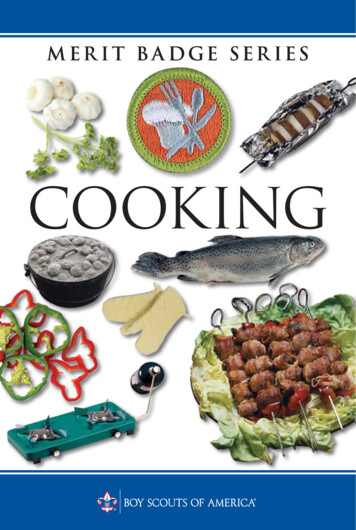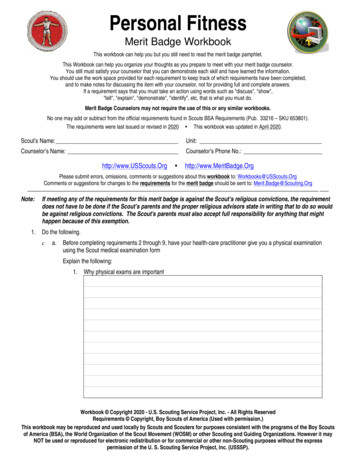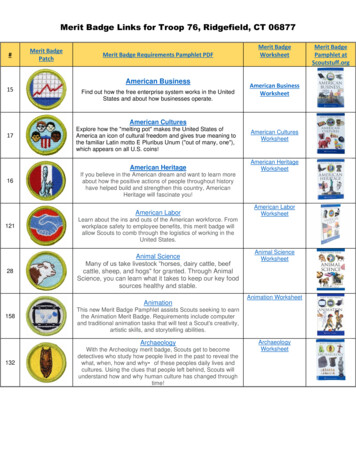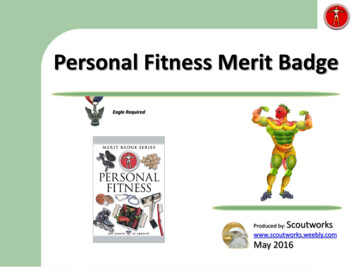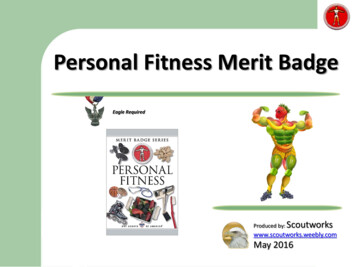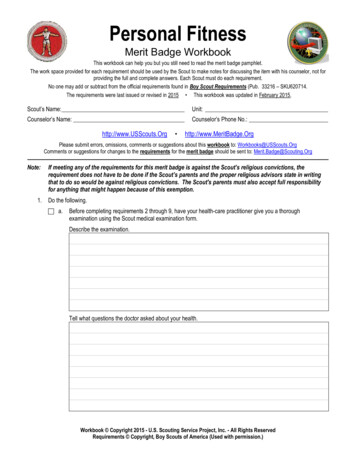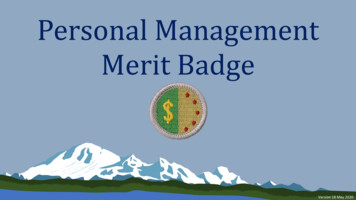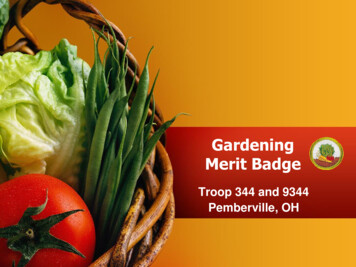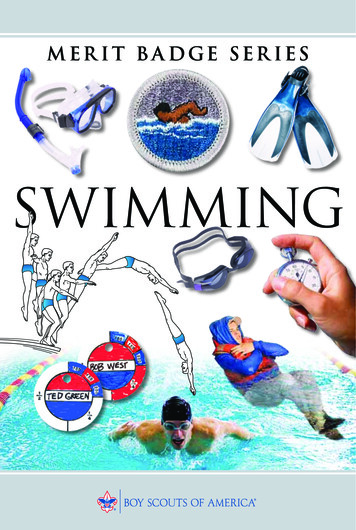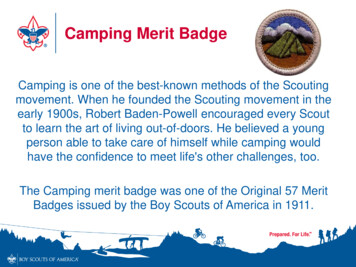
Transcription
Camping Merit BadgeCamping is one of the best-known methods of the Scoutingmovement. When he founded the Scouting movement in theearly 1900s, Robert Baden-Powell encouraged every Scoutto learn the art of living out-of-doors. He believed a youngperson able to take care of himself while camping wouldhave the confidence to meet life's other challenges, too.The Camping merit badge was one of the Original 57 MeritBadges issued by the Boy Scouts of America in 1911.
Merit Badge Completion You will earn the Merit Badge when you have completedall the requirements of the MB and have a follow-upmeeting with your Merit Badge Counselor. If you have any questions, you may contact MBCounselor, ASM Joe Carrasco, via email atjoe@rwstroop61.org. Always copy your parent or Scoutmaster Lawrence(lawrence@rwstroop61.org) when communicating byemail. An electronic copy of this presentation can be found atrwstroop61.org/reference .
Purpose of this MB class Will be taught somewhat in reverse compared to Merit Badgemidway. No prerequisites need to be completed, we are startingnow! Some of the requirements will be completed in this class, some infuture meetings, some on campouts, and some on your own. We will meet prior to a future camping trip for a planning session. Itwill be this group’s responsibility to perform a good portion of theplanning for this camping trip. You must complete 20 nights of camping to earn this MB. After you have completed the 20 nights of camping, schedule ameeting with your Camping MB counselor to check off therequirements and earn the badge.
What you need The Camping MB book. You must have read thebook. A Blue Card The Camping Merit Badge workbook Complete the workbook as we discuss the topics!
Challenging Requirements 4 A/B – Help a Scout Patrol prepare for a campout. (Duty roster,menu plan, equipment needs, general plan & camp setup) * 8D – Cook meals – at least one a lightweight stove * or ** 9A - Completed 20 nights of camping signed off in Scout Book. 9B – Complete 2 (Hike up a mountain, backpack, snowshoe, orcross-country ski, take a bike trip, float trip of at least four hours,overnight snow camp, or rappel) 9C – Perform a conservation project * or ** * Can be done at Troop camping trip ** Can be done at Summer camp
Requirement 1A - Preparation What are the most likely hazards you may encounterwhile participating in camping activities, and what youshould do to anticipate, help prevent, mitigate, andrespond to these hazards. P15-16 You may be far from help. Make sure others knowwhere you are going and when you will be expectedback.
Requirement 1B – First Aid Show that you know first aid for and how to preventinjuries or illnesses that could occur while camping,including hypothermia, frostbite, heat reactions,dehydration, altitude sickness, insect stings, tick bites,snakebite, blisters, and hyperventilation.
Requirement 2 - Leave No Trace Plan ahead and prepareTravel and camp on durable surfacesDispose of waste properlyLeave what you findMinimize campfire impactsRespect wildlifeBe considerate of other visitors
Requirement 2 – Outdoor CodeAs an American, I will do my best to Be clean in my outdoor manners, (I will treat the outdoors as a heritage. Iwill take care of it for myself and others. I will keep my trash and garbageout of lakes, streams, fields, woods, and roadways.) Be careful with fire. (I will prevent wildfire. I will build my fires only wherethey are appropriate. When I have finished using a fire, I will make sure it iscold out. I will leave a clean fire ring, or remove all evidence of my fire.) Be considerate in the outdoors. (I will treat public and private propertywith respect. I will use low-impact methods of hiking and camping.) And Be conservation minded (I will learn how to practice goodconservation of soil, waters, forests, minerals, grasslands, wildlife, andenergy. I will urge others to do the same.)
Requirement 2 – Personal Plan(Do this on your own) Write a personal plan for implementing the OutdoorCode principles on your next outing. Complete and enter into MB workbook. Example: I will practice Leave no Trace principles at our nextcamp outing. I will be clean in my outdoor manners by makingsure that I do not litter next time I camp. I will pickup all trash that Isee even if it does not belong to me. I will be careful with fire byonly starting fire’ in authorized fire pits. I will never burn plastic oritems not intended to be burned. I will not poke the fire with a stickand then wave it around etc.
Requirement 3 – Make a CampingPlan (Do this on your own) Make a written plan for an overnight trek and show howto get to your camping spot using a topographical mapand compass OR a topographical map and a GPSreceiver. P22-24. http://topomaps.pickatrail.com/ has free topographic(“topo”) maps you can print.
I want to go to Zion National Park
Example Zion National Park, narrows camp. Obtain wilderness permit. Prepare camping equipment for onenight backpacking camping trip.(including waste disposal gear) Specialprecautions for river hike and keepinggear dry. Take bus to Temple of Sinawava stop Hike up river approximately 3.5 milesalong map route to Big Springs. Camp at Big Springs. Eat dinner andbreakfast. Return on day 2 via same trail.
Requirement 4A – Make a dutyroster Make a duty roster showing how your patrol is organizedfor an actual overnight campout. List assignments foreach member. Troop forms (10 essentials list, camping personal gearlist, menu planner, & duty roster) can be found at:http://rwstroop61.org/reference/ PLs keep blank copies of the menu planner, & dutyroster in their Patrol binder.
Requirement 4B – Plan an actualcampout Help a Scout patrol or a Webelos Scout unit in your areaprepare for an actual campout, including creating theduty roster, menu planning, equipment needs, generalplanning, and setting up camp.–––––Duty roster,Menu planning,Equipment needs,General planning,Setting up camp.
Requirement 5A – Clothing Prepare a list of clothing you would need for anovernight campout in both warm weather and coldweather.– Warm weather– Cold weather Explain the term layering
Requirement 5B - Footwear Discuss footwear for different kinds of weather and howthe right footwear is important for protecting your feet.
Requirement 5C – Equipment care Explain the proper care and storage of campingequipment (clothing, footwear, bedding, etc.).
Requirement 5D – OutdoorEssentials List the outdoor essentials necessary for any campout,and explain why each item is needed.
Requirement 6A - Tents Describe the features of four types of tents, when andwhere they could be used, and how to care for tents.
Requirement 6B – Camp sanitation Discuss the importance of camp sanitation and tell whywater treatment is essential. Demonstrate two ways to treat water.
Requirement 6C – Where to pitchyour tent Describe the factors to be considered in deciding whereto pitch your tent.
Tent Ventilation, Rain Fly, & whento stake
Requirement 6D – Packs Tell the difference between internal- and external-framepacks Discuss the advantages and disadvantages of each.– Internal Frame Pack– External Frame Pack
Requirement 6E – Sleeping bags Discuss the types of sleeping bags and what kind wouldbe suitable for different conditions. Explain the proper care of your sleeping bag and how tokeep it dry. Make a comfortable ground bed. (Do during nextcamping trip)
Requirement 7A – Prepare forcampout with your Patrol Prepare for an overnight campout with your patrol bydoing the following: Make a checklist of personal and patrol gear that will beneeded. Pack your own gear and your share of the patrol gearand food for proper carrying. Show that your pack is rightfor quickly getting what is needed first, and that it hasbeen assembled properly for comfort, weight, balance,size and neatness.
Requirement 8A - Stove Explain the safety procedures for:– Using a propane or butane / propane stove– Using a liquid fuel stove– Proper storage of extra fuel
Requirement 8B - Stove Discuss the advantages and disadvantages of differenttypes of lightweight cooking stoves.
Requirement 8C - Menu Prepare a camp menu. Explain how the menu woulddiffer from a menu for a backpacking or float trip. Give recipes and make a food list for your patrol. Plantwo breakfasts, three lunches, and two suppers.(Do on your own) Discuss how to protect your food against bad weather,animals, and contamination.
Example Cous Cous with chicken, peas and corn2 cups cous cous, 1 package concentrated chicken broth, 1 cup eachdehydrated peas and corn, 1/2 cup dehydrated chicken. 2 cups water. BEFORE CAMP: Mix dry ingredients at home. Store in plastic bag.AT CAMP: Boil water. Add dry ingredients & broth concentrate. Stir inchicken. Bring to boil and allow to sit covered for 10 min. Makes 2 largeservings.Think “dry”. Look for instant meals/boxes at supermarket that you add onlywater to. Remove items from box packaging and repack.You will have no refrigeration. Freeze dried or canned. Don’t bring cannedveggies, too much water weight. Save cans for meats like chicken. Baggedmeats are even better.
Requirement 8D – Menu Cook at least one breakfast, one lunch, and one dinnerfor your patrol from the meals you have planned forrequirement 8c. At least one of those meals must be atrail meal requiring the use of a lightweight stove. I will bring a lightweight camp stove to both summercamp and a future camping trip. You can fulfill thisrequirement at either of these locations. We will planthis menu together before we go camping.
Requirement 9A – Go Camping Camp a total of at least 20 nights at designated Scoutingactivities or events. One long-term camping experienceof up to six consecutive nights may be applied towardthis requirement. Sleep each night under the sky or in atent you have pitched. If the camp provides a tent thathas already been pitched, you need not pitch your owntent.Document in your book!
Requirement 9B – Do two of theseOn any of these camping experiences, you must do TWOof the following, only with proper preparation and qualifiedsupervision: Hike up a mountain, gaining at least 1,000 vertical feet.Backpack, snowshoe, or cross-country ski for at least four miles.Take a bike trip of at least 15 miles or at least four hours.Plan and carry out a float trip of at least four hours.Plan and carry out an overnight snow camping experience.Rappel down a rappel route of 30 feet or more.
Requirement 9C – ConservationProject Perform a conservation project approved by thelandowner or land managing agency. Examples– Trash removal at a campground– Trail improvements like blocking trail short cut trails or placingrocks to mark trails.– Clean out fire rings. I will check to see if there is anything we can perform asa troop at either summer camp or future camping trip.
Requirement 10 – What youlearned Discuss how the things you did to earn this badge havetaught you personal health and safety, survival, publichealth, conservation, and good citizenship.(Do on your own)
Camping Merit Badge Camping is one of the best-known methods of the Scouting movement. When he founded the Scouting movement in the early 1900s, Robert Baden-Powell encouraged every Scout to learn the art of living out-of-doors. He believed a youn
